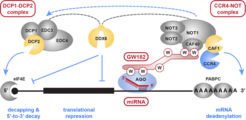Biochemistry - Elisa Izaurralde
In order to make a protein and thereby regulate any aspect of life, DNA first has to be transcribed into messenger RNA (mRNA). Elisa Izaurralde investigated the mechanisms that control the cellular fate of mRNA and hence are central to the regulation of gene expression at the post-transcriptional level. Her team combined cell-based assays and biochemical experiments guided by structure-based insight at the molecular level.

The regulation of mRNA turnover is a central means to control gene expression. A detailed understanding of this regulation requires insight into the repression of mRNA translation, into the inner workings of the DCP2 mRNA 5’ decapping network and its coordination with the CCR4-NOT deadenylase complex, and, finally, into how the CCR4-NOT complex is recruited to mRNA targets in the first place in order to elicit mRNA repression and decay.
Thanks to Elisa Izaurralde's seminal contributions we nowadays have a much better molecular understanding of how individual mRNAs are selectively targeted for repression and decay by sequence-specific micro RNAs or RNA-binding proteins. Her work identified downstream players in these processes and how these molecules are orchestrated and interact as parts of large and dynamic macromolecular complexes.
As the Director of the Department of Biochemistry, Elisa Izaurralde died untimely on Monday 30th April, 2018. She was much admired, respected and cherished not only by her mentees and close colleagues in the department but also in her field of RNA biology and the international scientific community.


